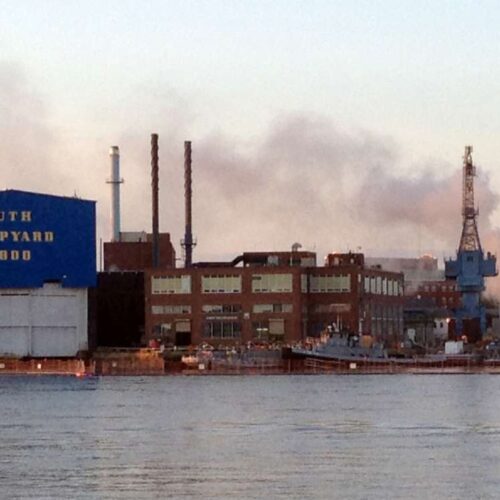Introduction
Update, July 24, 2012, 2:37p.m.: A civilian worker admitted to starting the fire aboard the USS Miami to leave work early, according to an affidavit filed by the Navy Criminal Investigative Service with the United State District Court in Portland, Maine. It said that while Casey James Fury was undergoing a lie-detector test, he told the NCIS he set fire to a few rags in a bunk room in the submarine, starting the fire that resulted in $400 million of damage to the vessel.
According to the seven-page affidavit, at the time he started the fire, Fury was anxious over a text message exchange with his ex-girlfriend about a man she had begun dating. Fury faces two counts of arson. If convicted of either, he could see a maximum penalty of life imprisonment and be forced to pay a fine of up to $250,000 along with restitution for damage caused to the submarine.
It can take a powerful enemy to damage the nuclear powered submarines that form the linchpin of the U.S. naval arsenal. The most worrisome threats are usually sub-killing torpedoes or large mines. But the subs’ designers evidently forgot to incorporate countermeasures against another threat: vacuum cleaners.
According to a news release Friday from the Portsmouth Naval Shipyard, it was a vacuum cleaner that caused an estimated $400 million in damages to the nuclear-powered USS Miami on May 23. The 22-year-old Miami was docked at Portsmouth as part of a dry dock repair period when the fire broke out, and over the next 12 hours it damaged crew quarters as well as command spaces and the torpedo room.
The fire did not damage the nuclear reactors, which were shut down two months earlier. “Findings indicate the fire started in a vacuum cleaner used to clean work sites at end of shift, and stored in an unoccupied space,” according the release. “Preliminary investigations indicate that the fire started with a heat source being vacuumed up and igniting the debris in the vacuum cleaner.”
In plain language: The vacuum sucked up something hot it shouldn’t have and, while sitting in a closet, ignited. It sounds like a cigarette. But a shipyard spokeswoman, Debbie White, said there is a no-smoking policy on board even while the ship is in dry dock and that it is currently unclear what the “heat source” that started the fire was.
“We have an investigation, and the investigation’s ongoing,” White said. “What exactly started the fire, we won’t know until that’s through.”
The $400 million repair estimate is likely to go up — the Navy estimates another $40 million could be needed for “secondary effects, such as disruption to other planned work across all Naval Shipyards, and the potential need to contract work to the private sector.”
The Miami is one of 42 active Los Angeles class nuclear-powered submarines. The Navy commissioned the ship in 1990 and has used it to carry out anti-submarine warfare exercises since it returned from deployment in worldwide anti-terrorism efforts in 2004. Armed with both torpedoes and Tomahawk missiles, the Miami can hold over 110 service members on board.
The Los Angeles class submarines are slowly being replaced by the newer Virginia class attack subs, which have been a source of budget disagreements between the Pentagon and members of Congress.
On its website, the Navy describes Los Angeles class subs as the “backbone” of the submarine force, a ship designed to engage enemy forces as well as carry out reconnaissance missions.
But never let it be said that Navy cannot adapt to rolling seas, or the threat posed by small suctioning motors: As a result of the fire, the shipyard has ordered that all of the industrial-strength vacuums be emptied at the end of each shift or removed from the ship.


Join the conversation
Show Comments